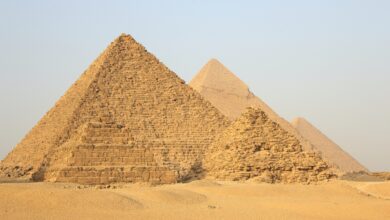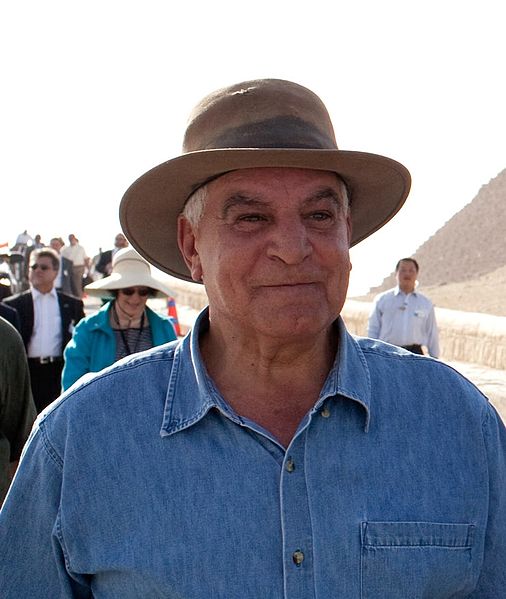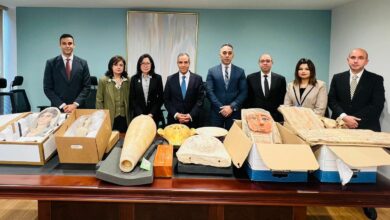Gamea al Sananeya is the street that epitomizes the bustling and colorful neighborhood of Wekalat al Balah, located on the Nile corniche halfway between the tall and slender white building of the Ministry of Foreign Affairs and the Nile Towers' millions of reflective windows.
One's first impression is of the ragtag ensemble the neighborhood offers to the newcomer, a pell-mell of rolls of thick colored fabrics for furniture covering, racks of second-hand clothes scattered in the middle of the street, and rubber and steel wheels in dark workshops.
At the beginning of the 20th century, Wekalat al Balah was Cairo’s main trade hub for dates coming all the way from Upper Egypt. Unloaded in the area’s harbor, some were then sold to retailers and customers locally, while some were exported to other countries in the region. But today refrain from chasing dates of any kind — they cannot be spotted anywhere despite the area having kept its name.
Sabry Abu Allam is the owner of a bright and spacious shop that sells all types of fabrics for furniture. He enthusiastically conveyed his knowledge of the history of this commercial neighborhood. “In the 40s, the area was famous for selling British and Egyptian military surplus, from military blankets to used uniforms of both armies,” he explains, browsing the surroundings with his pointed finger. The only trace of this activity today was spotted in a tiny plastic shop a few hundred meters away, where an old-school gas mask dangled from an iron rod, with a long recognizable khaki pipe.
Willing to disclose the wonders of the neighborhood he has been working in his whole life, he advised us to take the first street on the left, called Gamea al Sananey. This street, about 700 meters long, gathers workshops for making tent fabrics, carriage wheels and furniture fabrics, as well as an ancient Mameluke mosque.
Hundreds of rolls of motley fabrics are exhibited outside and inside the tiny shops, while workers sit on wooden chairs smoking Cleopatras and sipping hot Aroussa tea, patiently waiting for customers to show up. “We offer all types of fabrics for the house,” explains the owner of a nearby shop, stressing that the market is famous throughout Cairo for its choice of fabrics.
He explains that Copts represent about 60% of the population of the neighborhood, and that as a consequence the market is closed on Sundays. “We all work together here, Muslims and Christians," he explains, closing his fist as a sign of unity.
Indeed, a few meters down the road we stepped into a dark workshop where an entire Coptic family produces steel and rubber wheels for all sorts of carriages. “We own the workshop and the whole building on top of it," explains Maher Shahid, pointing at a hole in the ceiling through which the rest of the building could be seen. While a young man flattens strips of black rubber on a machine, another fixes the rubber around the metal structure. The owner explains that they sell these wheels to individual or companies, and that “although Chinese wheels are cheaper, their quality is far below ours.” On the walls, pictures of Pope Shenouda, the Virgin Mary and Jesus give touches of color to the otherwise dark surroundings.
In the middle of the street, two men unfolded a huge plasticized billboard ad and sewed it to a second piece. Sourial Rosallah, the owner of the shop that sells these plastic covers, explained that he purchases them from big companies such as Al-Ahram and Al-Akhbar and sells the finished product to construction companies. “Companies buy this plastic sheeting to cover and protect cement and sand piles on construction sites.”
A few hundred meters past these shops, the impressive mosque of Soliman Basha carved in dry stones appears against a backdrop of the modern Nile Towers, creating an interesting contrast. Adjacent to the mosque lies the ancient Salman Bacha hammam which has been rehabilitated and beautified by the Ministry of Antiquities. Unfortunately, you cannot get more than a glimpse of this remnant of the past as any visitor should be provided with a written authorization from Zahi Hawass to visit the premises.



